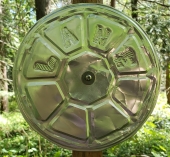posted 11 months ago
One of my favorite discoveries of my teenage years was in a poetry book. It was the parody of a famous American poem from the early 1800s.
Here's the original poem, for essential context:
The Old Oaken Bucket
by Samuel Woodworth, 1817
“How dear to this heart are the scenes of my childhood,
When fond recollection presents them to view!
The orchard, the meadow, the deep-tangled wild-wood,
And every loved spot which my infancy knew!
The wide-spreading pond, and the mill that stood by it,
The bridge, and the rock where the cataract fell,
The cot of my father, the dairy-house nigh it,
And e’en the rude bucket that hung in the well-
The old oaken bucket, the iron-bound bucket,
The moss-covered bucket which hung in the well.
That moss-covered vessel I hailed as a treasure,
For often at noon, when returned from the field,
I found it the source of an exquisite pleasure,
The purest and sweetest that nature can yield.
How ardent I seized it, with hands that were glowing,
And quick to the white-pebbled bottom it fell;
Then soon, with the emblem of truth overflowing,
And dripping with coolness, it rose from the well
The old oaken bucket, the iron-bound bucket,
The moss-covered bucket arose from the well.
How sweet from the green mossy brim to receive it,
As poised on the curb it inclined to my lips!
Not a full blushing goblet could tempt me to leave it,
The brightest that beauty or revelry sips.
And now, far removed from the loved habitation,
The tear of regret will intrusively swell,
As fancy reverts to my father’s plantation,
And sighs for the bucket that hangs in the well
The old oaken bucket, the iron-bound bucket,
The moss-covered bucket that hangs in the well!”
(For full parody appreciation, read it out loud slowly and savoringly. Then...)
“If we are honest, we can still love what we are, we can find all the good there is to find, and we may find ways to enhance that good, and to find a new kind of living world which is appropriate for our time.” ― Christopher Alexander






